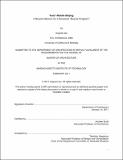| dc.contributor.advisor | Andrew Scott. | en_US |
| dc.contributor.author | Liau, August | en_US |
| dc.contributor.other | Massachusetts Institute of Technology. Dept. of Architecture. | en_US |
| dc.coverage.spatial | a-cc--- | en_US |
| dc.date.accessioned | 2011-05-23T18:08:34Z | |
| dc.date.available | 2011-05-23T18:08:34Z | |
| dc.date.copyright | 2011 | en_US |
| dc.date.issued | 2011 | en_US |
| dc.identifier.uri | http://hdl.handle.net/1721.1/63048 | |
| dc.description | Thesis (M. Arch.)--Massachusetts Institute of Technology, Dept. of Architecture, 2011. | en_US |
| dc.description | Cataloged from PDF version of thesis. | en_US |
| dc.description | Includes bibliographical references (p. 120-121). | en_US |
| dc.description.abstract | This thesis intends to be a catalyst for a renewed bicycle culture in Beijing, the capital of the former "Bicycle Kingdom". Beijing, only 15 years ago had more bicycles than any other city in the world, has in recent years undergone a drastic shift to become a city consumed by cars and highways, producing disruptive voids in the traditional small-scale fabric of the city that once made the old city unique. It has also produced the worst traffic in the world as well as some of the worst air pollution problems that any city has ever seen. This ironic shift from a city dependent on the most sustainable form of transit to one that is gridlocked by the form that is the least sustainable is what the thesis will critique. Recognizing that this shift is largely attributed to the changing culture of the citizens as they gain higher economic status, the thesis will attempt to create a project which creates a counter-culture to the current trend toward motor vehicles. It will target the population of the white-collar working class as its main audience, as they are the ones which are setting the trends of contemporary transportation in Beijing. The thesis proposes a new building typology for the city -a bicycle transit center which will occupy the void space produced by the highways. The center will provide an 'oasis' in the city, a place which promotes a lifestyle of wellness and sustainability centered around the daily bicycle commute - a lifestytle antithetical to that of the motor vehicle. The driving concept is "auto"-mobile lifestyle, derived from the literal meaning of the word for "bicycle" in Chinese: zi M ("auto/self") xing 'i ("mobile/sufficient") che * ("vehicle"). | en_US |
| dc.description.statementofresponsibility | by August Liau. | en_US |
| dc.format.extent | 123 p. | en_US |
| dc.language.iso | eng | en_US |
| dc.publisher | Massachusetts Institute of Technology | en_US |
| dc.rights | M.I.T. theses are protected by
copyright. They may be viewed from this source for any purpose, but
reproduction or distribution in any format is prohibited without written
permission. See provided URL for inquiries about permission. | en_US |
| dc.rights.uri | http://dspace.mit.edu/handle/1721.1/7582 | en_US |
| dc.subject | Architecture. | en_US |
| dc.title | "Auto"-mobile Beijing : a bicycle network for a renewed "bicycle kingdom" | en_US |
| dc.title.alternative | Automobile Beijing | en_US |
| dc.title.alternative | Auto-mobile Beijing | en_US |
| dc.title.alternative | Bicycle network for a renewed "bicycle kingdom" | en_US |
| dc.type | Thesis | en_US |
| dc.description.degree | M.Arch. | en_US |
| dc.contributor.department | Massachusetts Institute of Technology. Department of Architecture | |
| dc.identifier.oclc | 722942159 | en_US |
